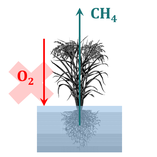Paddy soil greenhouse gas emissions
Irrigated rice paddies are a major biogenic source of CH4 and an important user of irrigation water. Adoption of water-saving Alternative Irrigation Management is essential to deal with a drier future climate and to mitigate global greenhouse gas emissions.
What we are doing
We compare biogeochemical processes in young floodplain paddy soils under Alternative Irrigation Management versus the conventional continuous flooding practice, aiming to better manage CH4 and N2O emissions.
Which methods do we use?
- We quantify the inhibition of CH4 oxidation by application of CH2F2 (as selective inhibitor of CH4 mono-oxygenase) in the field.
- We measure stable C isotopes in anaerobic and aerobic incubations, as well as in the field.
Open access
The obtained knowledge will complement the DeNitrification DeComposition Model, the most widely used biogeochemical model.

